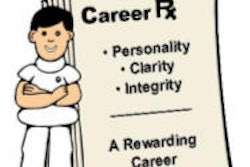AuntMinnie.com presents part four of an ongoing series on how to survive, grow, and profit from a satisfying career in healthcare informatics by Dan T. Erler of executive-search firm The Howard Group.
Welcome to stage two of 12 in the Job Discovery Wheel. In these two segments of the "Purpose" stage, we are going to talk about the art of self-promotion. In this segment, we will discuss the link between the corporate annual report and "You Inc."
Generally, the heart of business -- the return on investment (ROI) -- has three mantras: survive, grow, and generate a profit. Each year, publicly traded U.S. corporations submit historical documents, such as annual reports and various Securities and Exchange Commission (SEC) filings.
Part of the SEC's job is to ensure that investors have equal access to information about companies whose securities are publicly traded. If the stockholder, or potential investor, sees the numbers and performance they expect to gain from the sector, they invest. If not, they see the firm as undesirable, and do not invest or sell off their interest. Each accounting cycle, firms fall off the investors' radar and some are delisted.
The parallel of this to your career is remarkable. Your objectives are to survive, grow your career, and make a profit (total compensation). Let us look at your "annual report."
Your annual report
How do you know or ascertain your value, or just how valuable you are? First, you need to appreciate that the annual review is actually a part of a rehiring process. A raise (vote of confidence and appreciation) is not an entitlement. The equation "assets = liabilities + owners' equity" is central to the corporate balance sheet. Liabilities (not the recently popular lie-abilities) are the debts of the business and owners' equity (or shareholders' equity) is the difference between the recorded values of the assets and liabilities. As an employee resource, you want to be seen as owners' equity rather than a liability.
In the future, you will receive an annual report in the form of a performance and behavior evaluation. Your report to your stockholders is your list of achievements and accomplishments (resume). Your SEC filing (internal, yet public record) is what your boss reveals in your review.
Finally, your performance and behavior appraisals are your history and are what investors (your boss and human resources) use as a basis to decide how much they will invest in you over the next annual cycle. Enough poor performances and you may be delisted (fired).
How do your annual report and SEC filings look? Do you know what they looked for? How do you construct a good report? Most do not know and thus receive lower increases (total compensation packages), and wonder why their stock is undervalued. I trust you are beginning to sense that you are a publicly traded entity, too.
Simply showing up and doing a good job does not get you recognized and summarily rewarded. The question is: "How do you tip the scale to your advantage?" Let's start by discussing stockholders.
Your stockholders
Who are your stockholders? Your shareholders include your resume, your family, your boss, your peers, and your future pay increases. They all hold you accountable for your results. Print my last article "Have you outlived your stay or present position?" and review the two lists. Here are the first few from each list:
List one: Liabilities on the career balance sheet
- Get lazy and simply stop or cease working hard enough.
- Work on the wrong things and at the wrong time.
List two: Assets on the career balance sheet
- They ignored conventional limitations and were rarely satisfied where they were; they wanted uniqueness.
- They had written goals and measured their own behavior.
A way to maximize shareholder value: work at keeping list two in your sights while frequently adjusting your mirrors to minimize the (blind spot) activities relating to list one. Printing the two reference lists and keeping them handy will help keep your focus. However, it is also not enough to perform well -- you must also get noticed and not let your efforts and resulting achievements become invisible or diminished.
Building a solid balance sheet
The first key: Do a good job. The next key: Get noticed for your contributions. The final key: Receive a fair value for what you bring to the table. The sad part is less then 5% of people will actually put in the effort necessary to receive a fair increase. The truth is that the company will determine your raise but that is not the whole truth.
Here is a bit of recruiter wisdom (observed by listening to scores of career stories): Employers do not give raises -- employees earn them! What they buy from you is the use of your talents, skills, and abilities to help them satisfy and drive their shareholder value.
The more value you visibly demonstrate, the more likely your rehiring compensation package will be open to negotiation and sweetened (dividends paid to you). The cheaper they can get you to work, the better for them; so if you do not know, and are unable to defend your value, then you accept their offer and conditions, or move on. Let's work on getting you noticed.
Your plan for a great annual report
Foremost you should understand the expectations so you can point your performance radar in the right direction. Start a performance and expectations journal. This is where you will capture and analyze your work (output) in terms of measurable results. Not just your perception, include your bosses perceptions, too.
To analyze your results, you need to know what matters to your boss (the raise grantor). You should have some awareness of what puts money in their pay or bonus check. How they look (promotionally) and what they are passionate about are important, too.
Once you are clear on the list of expectations and deliverables, you then catalog them in your performance and expectations journal. You can now utilize your journal to purpose or repurpose your activities and work efforts.
Throughout the year you work on achieving results. A few months ahead of your annual review, you send a one-page memo tactfully reminding the reviewer of your achievements. In a later article, I will show you how to use the memo as a tool to negotiate your raise. Here is a starter list for you to query your organization, build your journal, and improve your stock as it relates to your annual review. Be prepared to help them understand your contributions, achievements, and value leading up to the annual review.
- List three: Measurable results
- Did this person increase profits (what are they looking for and how will they measure it)?
- Did they decrease costs (what are they looking for and how will they measure it)?
- Did they improve operational efficiencies (how will the cost of the improvements be viewed)?
- Did they meet expectations (what does meet mean -- more than two sentences)?
- Did they exceed expectation (what does exceed mean -- more than three sentences)?
- What else did they improve (what is the procedure to document improvements)?
Make sure when they quote percentages, you know how they will be measured and how they acknowledge your contribution to the process. The TV series "The Apprentice" demonstrates how poorly some people document contributions allowing others the opportunity to lay claim to their share of the contribution. Your journal is your defense mechanism against corporate identity or opportunity theft.
It's a wrap
I trust list three serves as a starter tool for you to do that ROI check. In the next article of the series, we will continue in the "Purpose" phase and will examine how to build a network of sponsors.
By Dan T. Erler
AuntMinnie.com contributing writer
October 24, 2006
Erler is an executive recruiter and director of healthcare informatics for the Overland Park, KS-based executive search firm The Howard Group. He attended the U.S. Naval Academy, chased submarines, served as a "cultural expressions" instructor, hosted a talk-radio show focusing on senior healthcare, and has worked with the Salvation Army as a board member. He is also author of the forthcoming book, The Job Discovery Wheel -- A Career Journey from Awareness to a Bright Future, scheduled for publication in 2007.
Related Reading
Have you outlived your stay or present position? October 4, 2006
Are you considering changing jobs for the right reason? September 13, 2006
My career in healthcare informatics: Is it still right for me? August 16, 2006
PACS administrator certification efforts heat up, June 20, 2006
PACS administrator role requires planning, vigilance, March 11, 2005
Copyright © 2006 Dan Erler



















